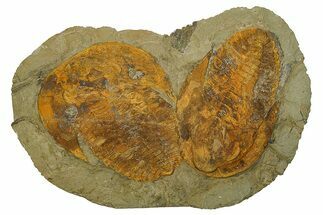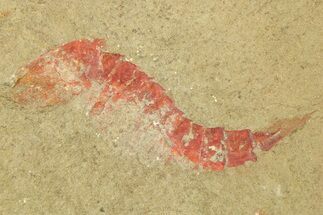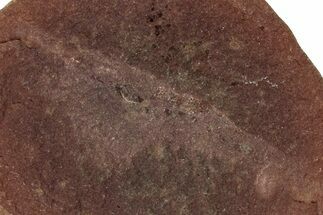This Specimen has been sold.
6.4" Fossil Pipefish (Hipposyngnathus) Pos/Neg - California
This is a rare, 6.4" wide example of Hipposyngnathus imporcitor, an uncommon and extinct species of pipefish found in California. The light-brown color preservation of the fossil contrasts nicely against the creme colored chert.
Both the positive and negative split of this pipefish are included, along with a pair of display stands.
Both the positive and negative split of this pipefish are included, along with a pair of display stands.
These pipefish (pipe-fishes) come from a new deposit within the Monterey Formation located in Santa Barbara, California, discovered in May of 2016. Pipefish fossils are quite scarce: less than a handful of sites are known to produce these elusive fossils. A unique aspect of the pipefish fossils from this location is the prevalence of infants found alongside adult males, bringing to question whether the fish were brooding and expelled upon being buried, or if this site was a pipefish nursery. As more of this material is excavated, there is hope that some of these questions will be answered.
Pipefish are straight-bodied, extant relatives of seahorses. They have long tube-like snouts that end in small, narrow, and toothless mouths. Their bodies are long and snake-like, with a single dorsal fin that, in some species, is the only organ present for mobility. Because of this, many are weak swimmers in open water, moving primarily by rapidly waving the dorsal fin and, in most cases, using whatever form of caudal fin is present on the species. They generally inhabit sheltered areas in coral reefs or seagrass beds.
Pipefish are straight-bodied, extant relatives of seahorses. They have long tube-like snouts that end in small, narrow, and toothless mouths. Their bodies are long and snake-like, with a single dorsal fin that, in some species, is the only organ present for mobility. Because of this, many are weak swimmers in open water, moving primarily by rapidly waving the dorsal fin and, in most cases, using whatever form of caudal fin is present on the species. They generally inhabit sheltered areas in coral reefs or seagrass beds.
SPECIES
Hipposyngnathus imporcitor
LOCATION
Santa Barbara County, California
FORMATION
Monterey Formation
SIZE
Pipefish: 6.4" wide (straightline), Chert: 7.05 x 6.1"
CATEGORY
SUB CATEGORY
ITEM
#275042
We guarantee the authenticity of all of our specimens.
 Reviews
Reviews
















